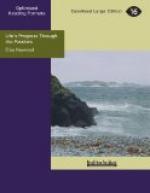He began with asking what had induced him to think of leaving England in the manner he was going to do;—reminded him of the estate to which he was born, the family from which he was descended, and the education which he had received; and then set before his eyes the tenderness with which his father had used him, the grief to which he had exposed him, and above all the madness of his present intentions:—Natura knew all this as well as he that remonstrated to him; but as he had not been capable of listening to his own reflections on that head, all that was said had not the least effect upon him, and the merchant could get no other answer from him, than that as things had happened, he had no other course to take.
The truth was, that as he could not imagine by what means the merchant was apprized of his design, he thought his father was also not ignorant of it; and as he did not vouchsafe either to come in person, or send any message to him from himself, and perhaps was even ignorant that the merchant had any intention of reclaiming him, he looked upon it as a confirmation of his having intirely thrown off all care of him, and in this supposition he became more resolute than ever in his mind, to go where he never might be heard of more.
‘What though,’ said the merchant, ’you have been guilty of some youthful extravagancies, I am perfectly assured there requires no more than your submitting to intreat forgiveness, to receive: come,’ continued he, ’I will undertake to be your mediator, and dare answer I shall prevail.’—’No, sir,’ replied Natura, ’I am conscious of having offended beyond all possibility of a pardon;—nor can I ever bear to see my father again.’
The merchant laboured all he could to overcome this mingled pride and shame, which he perceived was the only obstacle to his return to duty; but to no purpose, Natura continued obstinate and inflexible, till his father, having no longer patience to keep himself concealed, rushed into the room, and looking on his son with a countenance which, in spite of all the severity he had endeavoured to assume, betrayed only tenderness and grief.—’So, young man,’ said he, ’you think it then my place to seek a reconciliation, and are perhaps too stubborn to accept forgiveness, even though I should condescend to offer it.’
Natura was so thunderstruck at the appearance of his father, and the manner in which he accosted him, that he was far from being able to speak one word, but threw himself at his feet, with a look which testified nothing but confusion: that action, however, denoting that he had not altogether forgot himself, melted the father’s heart; he raised him, and forcing him to sit down in a chair close by him; ‘Well, Natura,’ said he, ’you have been disobedient to an excess; I wish it were possible for your distresses to have given you a remorse in proportion;—I am still a father, if you can be a son.’—He would have proceeded, but was not able:—the meagre aspect, dejected air, and wretched appearance of a son so dear to him, threw him into a condition which destroyed all the power of maintaining that reserve which he thought necessary to his character.




